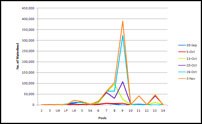Introduction to Our Waterbird SurveysThe number of waterbirds on the pools within the survey area is monitored to determine population sizes, habitat usage, and the waterfowl's response to management actions. Survey flights ran weekly through the autumn migration, weather premitting. In 2009, the flights covered Pool 2 (backed up by Lock and Dam 2 at Hastings, MN) to Pool 14 (backed up by Lock and Dam 14 at LeClaire, IA). (Map) Waterbirds Start Arriving in SeptemberIn late September there were a little over 17,000 ducks using the stretch of Mississippi River between St. Paul, MN and Rock Island, IL. By the third week in October, however, that number exceeded a quarter million. And they arrived suddenly. Pool 9 lies on the river at the Minnesota and Iowa border and has excellent diving duck habitat. Diving ducks included redhead, canvasback, ringneck, scaup, goldeneye, bufflehead, merganser and ruddy ducks. Pool 9 contained no diving ducks on September 30 and only twenty on October 5. A week later that number had increased to 22,655 diving ducks and by October 20 that number had burgeoned to 98,700. 
Tracking the MigrationSurvey numbers are available for Pools 2 through 14 on the U.S. Fish and Wildlife website. This is the first year the survey included the reach of the Mississippi River between St. Paul and Lake Pepin, but the USFWS website does contain links to data from previous years for the area from Wabasha to Rock Island. Waterbird Usage Indicates Habitat QualityData for the reach of the river above Lake Pepin is sparse and doesn't tell us much yet, but it appears duck numbers are significantly higher downriver of Lake Pepin. This may be due in part to the presence of better habitat. On October 20, 2009, Pool 5 contained 8,900 diving ducks and Pool 6 contained 13,600 diving ducks. Pool 5A, which sits between Pools 5 and 6 contained only 50 diving ducks. |
Last updated: December 11, 2017
